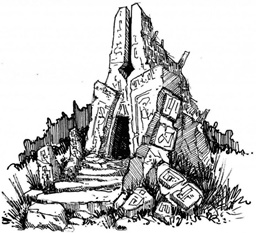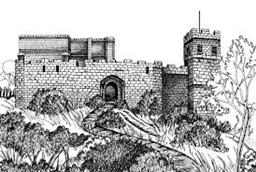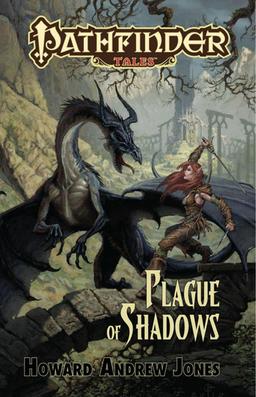Modular: Successful Adventuring — Or, Staying Alive & Getting the Gold
 Creighton Broadhurst is the founder and head honcho of Raging Swan Press, one of Pathfinder‘s leading third party publishers. His Shadowed Keep on the Borderlands is the spiritual successor to the old moat house in The Village of Hommlet. Creighton plays Pathfinder, but he approaches the rules-heavy game with an old school style, which is something I’ve been trying to figure out for myself.
Creighton Broadhurst is the founder and head honcho of Raging Swan Press, one of Pathfinder‘s leading third party publishers. His Shadowed Keep on the Borderlands is the spiritual successor to the old moat house in The Village of Hommlet. Creighton plays Pathfinder, but he approaches the rules-heavy game with an old school style, which is something I’ve been trying to figure out for myself.
His blog features lots of lists: GM advice, player tips, favorite modules, etc.. I broke his 25 Dungeon Delving tips into Parts One and Two and added my own comments (nothing like letting somebody else do the heavy lifting for a good post!). It seemed to work and Creighton didn’t mind, so I’m going to write some more Modular posts along those lines, like this one.
The Principles and bolded text below are Creighton’s, followed by my comments. Please share your thoughts on these principles and definitely go check out Creighton’s blog: it’s got a lot of great stuff for both players and GMs. And if you’re looking for some products to help out with your game, head on over to Raging Swan Press.
Selection and Maintenance of the Goal
A single, unambiguous goal is the keystone of a successful foray. Selection and maintenance of the goal is the master principle of adventuring. Do not get sidetracked or distracted; that way, disaster lies.
This is the opposite of the “Ooh, shiny object” approach. It’s so easy to get off track and chase after the ‘thing of the moment.’ Rumor of a dragon in the mountains, let’s go get him! Treasure in a cave outside of town? We’re on it! Heard a sound down that tunnel, turn left.
Staying alive is objective number one.
Achieving the goal is number two
Often closely followed by, number three, get treasure.
But losing sight of number two (often because of number three), can end up with a total failure of number one. Don’t forget you should be where you are for a reason and don’t lose sight of what you’re supposed to be doing.
Maintenance of Morale
Morale is a positive state of mind derived from inspired leadership, a sense of shared purpose and values, well-being, perception of group worth and cohesion. A party with high morale succeeds where others fail.
Think about this in your real-life work situation. Seems like there’s always that gloomy Gus person who constantly complains about everyone and everything else. Is that person ever the high performer? I call them the ‘Eeyore’ after the complaining donkey in Winnie the Pooh
This principle applies both to the party and the players. If the players are having a good time — if they are enjoying the adventure and are invested in what’s happening with each dice roll — their characters are going to reflect that. So, it’s a shared duty for players and GM.
Offensive Action
Offensive action is the practical way in which a group of adventurers seek to gain advantage, sustain momentum and seize the initiative.
 “I don’t know, what do you want to do?” often results in an unpleasant encounter with a wandering monster. The fighter charging headlong into a cave full of enemies may not be the best approach. But in an adventure there’s some type of other side that wants to see you fail: and if you’re dead, that works for them. Acting (as a group) instead of reacting gives the party some control over events.
“I don’t know, what do you want to do?” often results in an unpleasant encounter with a wandering monster. The fighter charging headlong into a cave full of enemies may not be the best approach. But in an adventure there’s some type of other side that wants to see you fail: and if you’re dead, that works for them. Acting (as a group) instead of reacting gives the party some control over events.
Security
Security is the provision and maintenance of an operating environment that affords the necessary freedom of action, to achieve the objective.
I’m not exactly sure what Creighton means here. Obviously, when the party camps, they should set up a watch. And marching order should be arranged in such a way that the ‘weaker’ members are protected from attack. But I’m a bit fuzzy on this one.
Surprise
Surprise is the consequence of shock and confusion induced by the deliberate or incidental introduction of the unexpected to the enemy.
This is a mechanical principle. In my two games of choice, Pathfinder and Swords & Wizardry, there is a surprise round. A party that surprises the opponent can have a SIGNIFICANT advantage. Also, the GM likely has some plan of action in mind for the enemy.
However, unanticipated actions can also be Surprise. If the party introduces some unexpected element into things, that plan may no longer be practical or effective.
Concentration of Force
This could also be called, ‘Don’t split the party.’ Concentration of force involves the decisive, synchronized application of superior fighting power to achieve success.
 Unless time is an objective, it certainly makes sense to keep the party together. Think of the party as a collection of weapons. When you split the party, you decrease the number of weapons available. The problems encountered are unlikely to reduce in level/strength because you split the party (there are situations where that will happen, of course, but in general…). That Ogre didn’t get smaller because your Ranger and Thief went down another hallway.
Unless time is an objective, it certainly makes sense to keep the party together. Think of the party as a collection of weapons. When you split the party, you decrease the number of weapons available. The problems encountered are unlikely to reduce in level/strength because you split the party (there are situations where that will happen, of course, but in general…). That Ogre didn’t get smaller because your Ranger and Thief went down another hallway.
Keep your party together and all of your strategies, tactics and weapons will be in play.
Now, this is never applied in epic fantasy novels, because the author usually wants to tell multiple stories, so the group is split and different things can go on at the same time. But as usual, I digress. One of the early gaming-related web series’ was called Gold and never splitting the party was a key theme. I’ll be doing a separate post on this principle.
Economy of Effort
Economy of effort is the judicious exploitation of the party’s resources including manpower, material and time to achieve the objective. Use just enough of your resources to achieve your objective.
I’ve made the observation many times that we are RPGing in an MMO era (major post coming on that). If a character dies, you just respawn.
Same thing if you make a poor choice in a PC/console game – just load a saved game. Wade into combat like a tank, use your spells, then rest up for a few seconds. Who needs to use a torch anymore?
Resources of all types mattered in old school gaming. They still can in more modern RPGing, but that really seems to depend upon the GM. One of Matt Finch’s Zen Moments was ‘Player Skill, not Character Abilities.’ That’s exactly what this principle is about. It’s not the mechanics of the system (like an MMO/PC game), or the feats on your character sheet. It’s how you play the game (a little Herm Edwards there).
You don’t use a bazooka in every room. You do just enough to succeed in the task at hand. Then you move on to the next one. This is an important part of RPGing and probably worthy of another post in itself.
Flexibility
Flexibility – the ability to change readily to meet new circumstances – comprises agility, responsiveness, resilience, acuity and adaptability.
Pretty much a real life lesson here. The party should have a goal; and a plan to achieve that goal. But it sure as heck better be ready to adapt to circumstances as they arise. I’ve added my own Principle at the end of this list, and it relates to Flexibility. But the party that can’t react to exigent events as they arise is probably going to join the TPK (Total Party Kill) club.
Cooperation
Cooperation entails the incorporation of teamwork and a sharing of dangers, burdens, risks and opportunities. Every member of the group should participate equally taking into account his abilities, skills and gear.
 Another topic I’ll write about elsewhere, as Gary Gygax had some serious thoughts about working together in his book, Role Playing Mastery (which will likely be the subject of a series of Modular posts). But it’s not much of a party if folks aren’t working together. It’s also less enjoyable for the players when someone is often out for themselves. Like, say, if the Rogue keeps filching items from party members.
Another topic I’ll write about elsewhere, as Gary Gygax had some serious thoughts about working together in his book, Role Playing Mastery (which will likely be the subject of a series of Modular posts). But it’s not much of a party if folks aren’t working together. It’s also less enjoyable for the players when someone is often out for themselves. Like, say, if the Rogue keeps filching items from party members.
I play the MMO Age of Conan and I adventure solo. Sometimes I do team up with another person, and it’s usually fine. But when you join a group in an MMO, it’s not uncommon to have somebody completely doing their own thing and it impacts both the group and the individual as a player. Sometimes a group quest is nothing but running along as fast as you can to keep up. And for me, that’s not fun at all. It takes the whole group to succeed in an RPG. But it only takes one member for failure on multiple levels.
Sustainability
To sustain a force to generate the means by which its fighting power and freedom of action are maintained. Make sure you are properly equipped.
Beyond the ‘properly equipped’ portion, another principle that’s not as self-evident to me as the others. Of course, I’m not that bright. I’d replace this with the one below.
Preparation (Bob’s Bonus Principle)
 The time to wish you had a 50′ rope and a grappling hook is not while you’re standing at the bottom of the cliff, looking at the ledge above. Or thinking maybe you should have bought some holy water as the zombies amble towards you. Properly equip your party BEFORE you venture forth. Or, while you’re out there. Taking those arrows from the dead bandit may pay off later.
The time to wish you had a 50′ rope and a grappling hook is not while you’re standing at the bottom of the cliff, looking at the ledge above. Or thinking maybe you should have bought some holy water as the zombies amble towards you. Properly equip your party BEFORE you venture forth. Or, while you’re out there. Taking those arrows from the dead bandit may pay off later.
I was reading Black Gate Managing Editor Howard Andrew Jones’ Plague of Shadows. The characters had been partying at an Elven reception the evening before. So much so that the young Wizard hadn’t bothered to memorize his spells for the day. The half-orc Fighter tells him, “That was folly.” Exactly!
Before leaving whatever base (a town, a camp, a room in the ruins), the party should be as prepared as it can be to meet all possible situations. For the want of a nail (That’s a Todd Rundgren song)! And while ‘on the move’ the party should prepare as best it can each time a decision is made. Send the Rogue forward to look for traps. The Wizard casts Shield on herself before entering the cave full of Bugbears. Whatever. Preparation can often be the difference between success or failure.
Again, please leave comments and open up discussion on these Principles of Successful Adventuring. We’ve got more on the way!
Prior RPG-related posts I’ve done here at Black Gate:
RPGing is Storytelling
Dungeon Delving Tips – Part I
Dungeon Delving Tips – Part II
Swords & Wizardry vs. Pathfinder
Swords & Wizardry Kickstarter
Perilous Vistas from Frog God Games
The Lost Lands for Pathfinder
The Northlands Saga – Complete
The Warlords of the Accordlands
Judges Guild Premium Editions
Gary Gygax’s Role Playing Mastery
Everything You Ever Wanted to Know About the Temple of Elemental Evil
The Village of Hommlet
Munchkin!
Runebound
Runebound – The Sands of Al-Kalim
Runebound – The Mists of Zangara
Necromancer Games (Part One of two)
Frog God Games (Part Two of two)
Dungeons and Dragons Adventure Game System
D&D Adventure Game System – Temple of Elemental Evil
Dungeon! Board Game
Conan: Age of Exiles
Steve Russell of Rite Publishing – RIP
The Art of Dungeons & Dragons Kickstarter
Astonishing Swordsmen & Sorcerors of Hyperborea – 2nd Edition
Mount & Blade Warband – Part One
Mount & Blade Warband – Part Two
Bob Byrne’s ‘The Public Life of Sherlock Holmes’ column ran every Monday morning at Black Gate from March 10, 2014 through March 20, 2017. He also organized Black Gate’s award-nominated ‘Discovering Robert E. Howard’ series.
He is a member of the Praed Street Irregulars, founded www.SolarPons.com, the only website dedicated to the ‘Sherlock Holmes of Praed Street’ and blogs about Holmes and other mystery matters at Almost Holmes.
He has contributed stories to The MX Book of New Sherlock Holmes Stories – Parts III, IV and V and VI and will be in IX if he quits having fun writing Black Gate posts and works on a story!